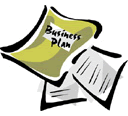Your business plan needs to reflect your unique business, industry and also your intended audience for your business plan. As such, you’ll need to make revisions to the basic business plans to make it specific for your business. Here are some of the areas to think about when making changes.
 The Type of Business
The Type of Business
What type of business are you planning on starting? Your business plan will vary a great deal depending on whether you plan to manufacture a product, provide a service, start a high technology company, or start a retail business. The following are some points to consider when modifying your business plan.
Manufacturing
- What are your planned production goals?
- What are the planned direct production costs and indirect (overhead) cost?
- What are the prices per manufacturing line?
- What is the overall gross profit margin and specific product line gross profit margin?
- What are the production or capacity limits for planned physical plant?
- What are the production or capacity limits of equipment?
- What are the purchasing and inventory management procedures?
- Are there any new products under development or anticipated products to manufacture after startup?
Service Businesses
- What labor costs are associated with this business?
- What (if any) fixed assets do you have?
- What are the key competitive factors in this industry?
- What pricing structure will you use?
- How did you establish these prices?
- How will you maintain quality? What are your control procedures?
- How will you measure labor productivity?
- Will you subcontract any labor to other firms? If so, what percentage will be subcontracted? Will you make a profit on subcontracting?
- What are your policies and procedures for credit, payment, and collections?
- How will you attract customers and keep your client base?
High Technology Companies
- What is the economic outlook for your industry?
- Will your company have information systems in place to manage rapidly changing prices, costs, and markets?
- How will your products and services be on the cutting edge?
- What is the status of current research and development? What is required to:
- Bring product/service to market?
- Keep the company competitive?
- How does the company:
- Protect intellectual property?
- Avoid technological obsolescence?
- Supply necessary capital?
- Retain key personnel?
High-tech companies are unique from other businesses in that they often have to operate without profits (and sometimes even without sales) for a long time. If your company is in this situation, you may have difficulty finding financing from a typical financial institution. In this case, venture capitalists may be willing to invest if you can provide sufficient explanation and background. Your plan will require longer-term financial forecasts to show when profit take-off will occur. Your plan must include all assumptions about your business and must be well documented.
Retail Business
- Company image
- Pricing structure:
- Explain cost versus markup policies.
- Explain how your prices are profitable, competitive, and in establish an image for your company.
- Inventory management systems:
- What is your selection and price of goods?
- How do you maintain inventory levels? Find industry average numbers for annual inventory turnover rate (available in RMA book). Multiply your initial inventory investment by the average turnover rate. The result should be at least equal to your projected first year’s cost of goods sold. If it is not, you may not have enough budgeted for startup inventory.
- Customer service policies: Your policies should be competitive and in accord you’re your company image.
- Location: Does it give the exposure that you need? Is it convenient for customers? Is it consistent with company image?
- Promotion: Methods used, cost. Does it project a consistent company image?
- Credit: Do you extend credit to customers? If yes, do you really need to, and do you factor the cost into prices?
For Financial Institutions
What type of business are you planning on starting? Your business plan will vary a great deal depending on whether you plan to manufacture a product, provide a service, start a high technology company, or start a retail business. The following are some points to consider when modifying your business plan.
- Financial institutions want assurance that loans will be repaid in an orderly fashion. If you intend using this plan to present to lenders, include:
- How much of a loan you require?
- How you plan to use the funds?
- What the loan will accomplish-how will it make the business stronger?
- Requested repayment terms (number of years to repay). You will probably not have much negotiating room on interest rate but may be able to negotiate a longer repayment term, which will help cash flow.
- Collateral offered, and a list of all existing liens against collateral
For Investors
- Investors have a different perspective. They are looking for dramatic growth, and they expect to share in the rewards:
- Funds needed short-term.
- Funds needed in two to five years.
- How the company will use the funds, and what this will accomplish for growth.
- Estimated return on investment.
- Exit strategy for investors (buyback, sale, or IPO).
- Percent of ownership that you will give up to investors.
- Milestones or conditions that you will accept.
- Financial reporting to be provided.
- Involvement of investors on the board or in management.
A well thought out business plan typically takes several weeks to complete. Most of that time is spent in research and planning. That’s why the business plan can be of such help to a new business – it gives you an opportunity to do research in ways you may not have considered previously. Take time to prepare the plan properly. Make sure you track your information and keep notes, so you can expand on your plan or answer questions later.